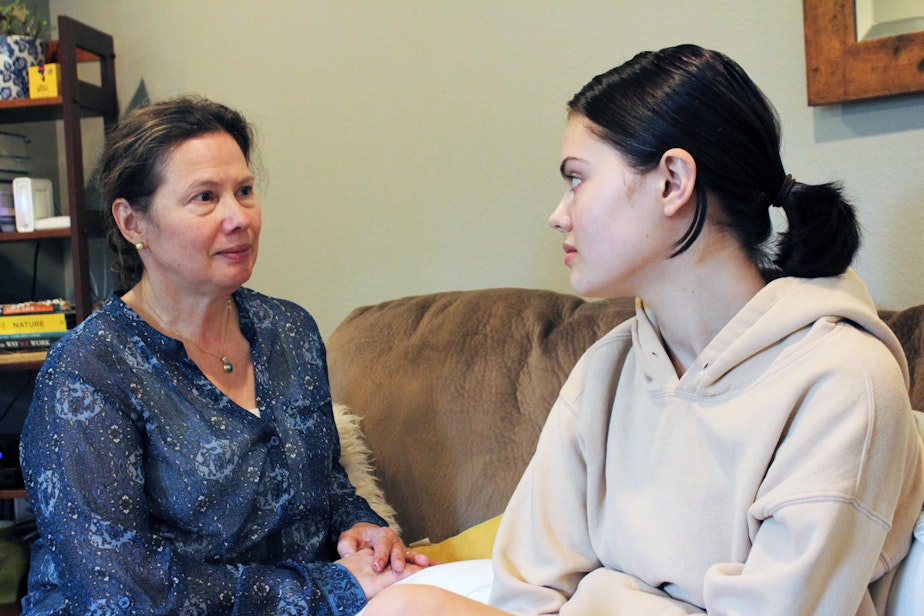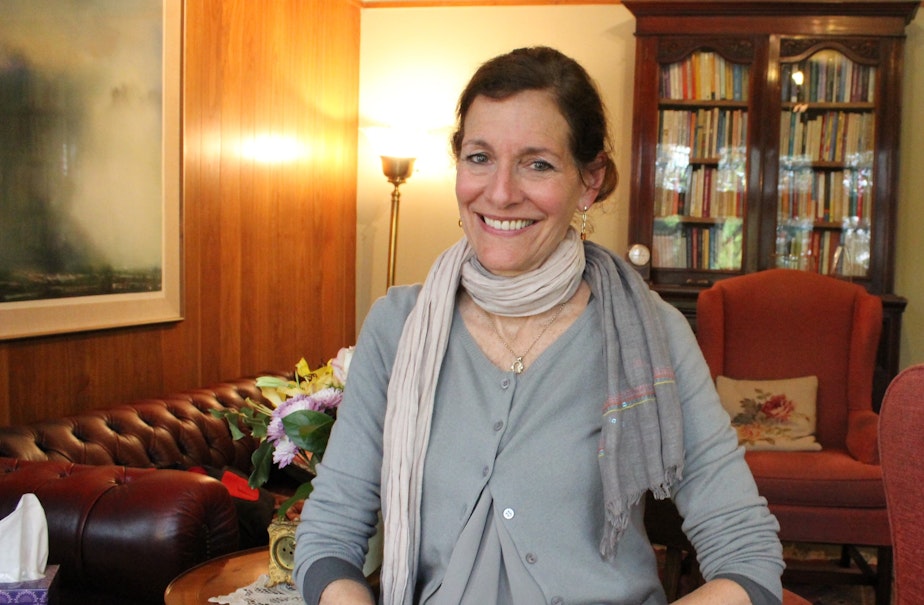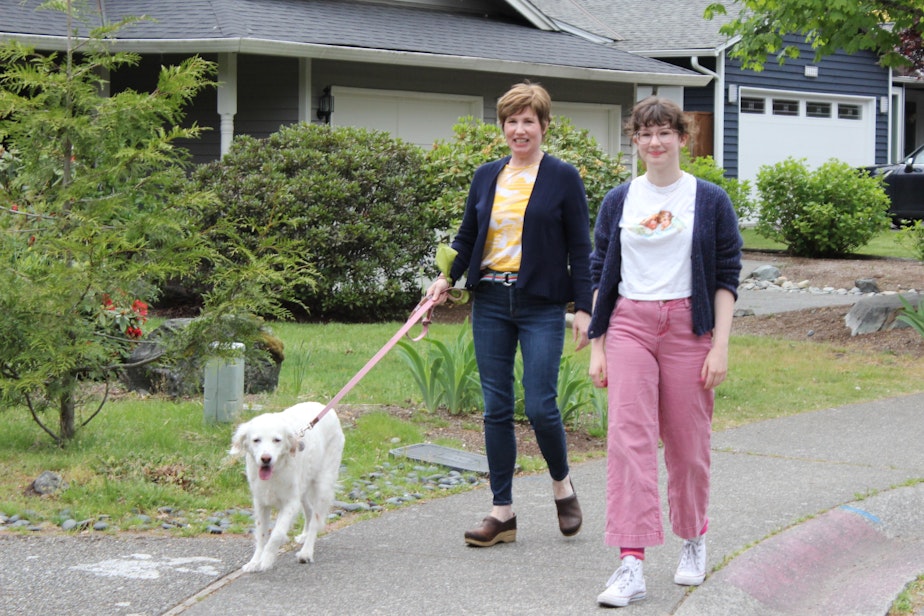'It's not your fault.' The pitfalls of parenting an anxious child

Anya Davis says she has been anxious for as long as she can remember.
On the first day of kindergarten, she remembers panicking when her mom, Jennifer Davis, dropped her off and then left.
“I’m like, why is she leaving? Somebody call 911! Somebody call CPS! Like, I am being left in the care of these people that I don’t know,” she said.
Whenever Anya got stuck in a cycle of worry, Davis believed it was on her, as Anya's mother, to step in. Anya would ask her mom for assurance that food was safe to eat, or that the dog was not going to die.
Davis would have to talk her down after a panic attack.
“It got to a point where I knew I had to tell her what she needed to hear in order for her to kind of reset and go forward,” Davis said.
Sponsored
At the time, Davis thought she was doing the right thing.
“I thought, oh my gosh, I’m the most patient mother of all time. I’m so patient, I deserve an award for this,” she said.
Anya was diagnosed with generalized anxiety disorder, but when she was a teen, doctors added another diagnosis: obsessive compulsive disorder, which is related to anxiety.
When Anya began treatment, Davis was surprised to learn that the constant reassurances she gave were just the opposite of what she was supposed to be doing.
Davis was crestfallen.
Sponsored
"I felt guilt," she said. "I felt like I had made things worse for her."
How anxiety can confound parents
Anxiety is a normal part of life. It’s our brain and body’s response to threats. It helps keep us alive.
But anxiety can become severe and debilitating. The brain can become hyper-alert to threats that aren’t there.
Psychologists say it’s often challenging to parent an anxious child. Even with the best of intentions, parents often do or say the wrong things.
Sponsored

“Nobody gives you the playbook for the ‘do’s and don'ts’ of this anxious child business. And it’s very counter-intuitive,” said Dr. Laura Kastner, a clinical psychologist and the author of five books on parenting.
Many parents make the mistake of over-accommodating their child’s anxiety. So if the child is anxious and wants to avoid the thing that is causing distress —like school, or social engagements, or going out to dinner — parents might allow them to avoid, believing they are doing them a favor.
“As a parent, it’s so natural to rescue your child and be nurturing and kind and scratch their back for three hours when they are crying and practically having a seizure with anxiety,” Kastner said.
The problem with that approach is that the child doesn’t learn to soothe him or herself.
Sponsored
Another potential pitfall for parents — they might not understand the strength of an anxious child’s emotions, or believe (and hope!) that they will grow out of these strong feelings.
That was the case with Valerie Horvath, whose daughter Ava Ludwig just graduated from high school.
Like Anya, Ava recalls anxiety being a part of her life since she was little.
“I would have such severe anxiety about things, such as my mom leaving the house or the possibility of me throwing up," Ava said. "Which are weird anxieties, but they dominated my life to the point where I would cry myself to sleep at night."
Ava’s anxiety also manifested as stomach aches, which caused her to miss school.
Sponsored
Her mom took her to a doctor, believing she might have a milk allergy. But they didn’t find a physiological cause.
“Then they said, well maybe she’s stressed," Horvath said. "As a parent you go, well, what is she stressed about? She’s in elementary school!”
From Ava’s point of view, even though her mom was trying to help, she didn’t seem to understand how extreme and debilitating anxiety felt to her.
“Every single time when I was struggling then, it was always like, 'Oh, it’s just high school.' 'Oh, you are just a teenager.' 'Oh, you are 16, everybody goes through this, you will be fine,'" Ava said.
"It was just so invalidating at that period of time because what I am experiencing is more than just being a teenager,” she said.
Horvath didn’t want to stoke Ava’s fears. She thought she would eventually outgrow them. She was basing her parenting on her own experience and her experience parenting her older son, who has a much different temperament.
“That would be one of the things that I would absolutely say we did wrong,” Horvath told Ava recently as they sat next to each other on a friend’s couch. “We didn’t validate your emotions. In fact, we tried to solve them. Which makes you feel even less confident.”
Horvath didn’t change her approach until her daughter started having serious struggles in 9th grade.
At that point, Horvath began started seeing her own therapist, and realized that she needed to do a 180-degree change in how she parented Ava. Once Horvath learned to validate Ava’s emotions, rather than dismiss them, things began to improve.
In retrospect, Horvath wished she had made those changes earlier. But she was doing the best she could with the knowledge she had at the time.
“Hindsight is 20/20,” Horvath said.

Parents can have anxiety too
Sometimes parents' own anxiety can get in the way of dealing effectively with their kids' emotions.
Anxiety has a genetic basis. Psychologists say that when kids are diagnosed with anxiety disorders, it’s typical to see at least one parent who suffers as well.
Alison McElroy is a mother of two girls who have struggled with anxiety. She herself struggles with anxiety and depression, and she has been through counseling.
Alison says when anxiety strikes, kids can act out in ways that are hard to manage. And that can trigger her anxiety, and make it harder to be an effective support for her kids.
“I’ve had to start counseling again because I just beat myself up as a parent all the time. And it’s exhausting and when you feel like you say the things that you would never say to your daughter, or your child, is really disheartening and really difficult,” she said.
And sometimes parents don’t realize they are dealing with their own anxiety until their kids enter treatment.
Anya Davis was admitted to an intensive outpatient treatment program for OCD at Seattle Children’s Hospital. During Anya's intake appointment, a therapist asked detailed questions about her symptoms. Her parents sat there making mental notes. They both realized that they also had anxiety and OCD tendencies.
Anya’s treatment involved intensive exposure therapy, which meant she had to confront things that caused her significant distress. That triggered her mom as well.
“There were times when you wanted to take them out. There were times when I was like, this is not okay,” Jennifer Davis said.
“The therapist would say, 'It seems like mom needs to leave the room,'" she said. "And you will be excused to go somewhere else and you would find another mom in the waiting room, and you would be like, 'Well, what did you get kicked out for?'”
How to avoid the pitfalls
Which is why Children’s Hospital includes parents as an essential part of their child’s treatment for anxiety. When kids are in treatment, parents meet in their own groups to share their experiences and to learn new skills.
They also have to confront their own strong feelings.
Dr. Kendra Read is the head of Anxiety Programs at Seattle Children’s Hospital. She says at the beginning of treatment, she gives parents this message:
“It is not your fault."
Parents often come into treatment with a lot of guilt. They may feel that they have somehow caused or exacerbated their children's anxiety. That's a natural feeling to have, but Read says parents need to move past it in order to bring about change.
"Sure, we are going to talk about ways that they can do these differently, and sure, we are going to talk about the genetic component," she said.
"But it does nobody any favor to sit and think, I did this to my child, this is all my fault, when we know that anxiety is a combination of a million different things that led us here," she said. "So let’s talk about what we can change in the moment moving forward."
In treatment, parents learn these lessons:
—How anxiety affects the body and brain
—How to help their kids recognize when anxiety arises
—How to validate their kids' emotions
—How to help them face their fears, instead of avoiding them
—How anxiety affects parents
—How to stay calm when kids are dealing with anxiety
It's a lot of work for both parents and kids, but Dr. Read said the payoff is that anxiety is highly treatable and she sees kids get better every day.
Resources:
To find providers in Washington state who specialize in children's mental health: Washington State's Mental Health Referral Service for Children and Teens
Seattle Children's Hospital Mood and Anxiety Program
Child Mind Institute: "What to Do (and Not Do) When Children Are Anxious"
Dr. Laura Kastner: "How Parents Can Combat The Stress Epidemic"
Anxiety and Depression Association of America: "Tips to Manage Anxiety and Stress"
Reporter Deborah Wang is spending the year doing stories on teenagers and mental health as part of a Rosalynn Carter Mental Health Journalism Fellowship. If you have a story you would like to share with Deborah, please email youthmentalhealth@kuow.org.




